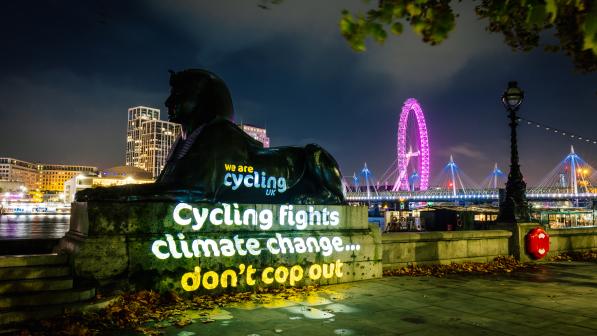Transport Committee report amplifies concerns about new roads and traffic growth

Yesterday, 27 July, the House of Commons Transport Committee released its Strategic Road Investment report, delivering a rare piece of good news to the sustainable transport world. In the report, the committee criticised the government for its approach to the Strategic Road Network (SRN), the 4,300-mile network of motorways and major A-roads in England.
Since 2015, the Department for Transport (DfT) has been required to set a Road Investment Strategy (RIS), which National Highways (NH) is then tasked with delivering. We are now mid-way through the period covered by the second strategy (RIS2, ending in 2025) so DfT is currently working with NH to plan RIS3.
Late last year the Transport Committee took the opportunity to launch an inquiry into the government’s performance on RIS2 and recommended changes for RIS3. Cycling UK submitted written evidence along with more than 50 other individuals and organisations. Yesterday’s report reflected the arguments made in those submissions.
Among other concerns, the committee made three excellent points:
- The government’s dependence on vehicle electrification to achieve transport decarbonisation makes net zero highly unlikely. The uptake of zero emissions vehicles has so far been quite slow, making it unlikely to mitigate rising traffic. The DfT forecasts increased SRN demand under all scenarios in its 2022 National Road Traffic Projections. As the Climate Change Committee has stated in its sixth carbon budget, net zero will likely require fewer cars, not just newer cars. The Welsh and Scottish governments have already accepted this, setting bold traffic-reduction targets for 2030. England and Northern Ireland need to catch up, rather than continuing to insist, as DfT has, that “roads will continue to be the predominant form of transport in a net-zero world, reflecting their flexibility and convenience to users and businesses” (p10). The committee recommends that at the very least, government should incorporate demand management into its modelling of pathways to net zero within transport. Crucially, the committee also called on DfT to consider whether it needs traffic reduction targets similar to those of Scotland and Wales.
- SRN investment should prioritise maintenance of existing roads over the building of new ones. Transport Focus noted in its written evidence that drivers would prefer to have better maintained and managed roads over new ones, and the AA found that its members were most concerned about potholes. Yet RIS2 allocated £14.1bn for new and enhanced roads – more than it did for operations and maintenance. The committee recommended that if necessary, funding put aside for costly new road projects should be reallocated towards existing road upkeep.
- Despite the government’s constant insistence on building more roads to stimulate economic growth, “the extent to which further investment in the network would help to boost growth, in comparison to investment in other modes of transport and connectivity, is contested” (p8). Moreover, the government’s separate policy objectives of economic growth and achieving net zero may well be at odds with each other.
The government’s determination to accommodate demand for new roads through investment without also considering steps to manage that demand is a risky strategy (p11)
Transport Committee Strategic Road Investment report
What Cycling UK has said
Many of the committee’s points reflected Cycling UK’s written evidence. We argued that investment in new roads is incompatible with net zero, and that RIS3 should focus on maintenance and on overcoming the safety and severance problems caused by the existing SNR, such as children on one side of a major road being unable to walk or cycle safely to schools on the other side.
More recently, we made similar points in our response to a DfT consultation regarding RIS3 (see below). In particular, Cycling UK has highlighted that a short-term emphasis on decarbonising operations and reliance on the proliferation of electric vehicles in the longer term is insufficient for achieving net zero. Transport investment should seek to reduce car dependence (aiming to reduce road traffic by at least 20% by 2030), not entrench it further.
We also pointed out that the government is not doing itself any economic favours by accommodating continued traffic growth through its road schemes:
- Congestion is estimated to cost the UK economy £30bn per year
- Air pollution is estimated to hasten between 28,000 and 36,000 deaths annually in the UK, at an economic cost of £20bn or more
- Collisions were estimated to cost the country £30bn in 2021
- Physical inactivity leads to ill health, costing the UK around £7.4bn annually
Cycling UK’s influence over the committee’s report and DfT consultation has been greatly amplified by our members and supporters. In fact, more than 1,300 people participated in our recent action to respond to the DfT’s consultation. A huge thank you to all of you for adding your voices to ours!
We still need your help: the Transport Committee is currently (until 25 August) accepting written evidence for another inquiry, this time regarding the government’s strategic transport objectives. Additionally, Cycling UK has just launched its ‘Drive less, cycle more’ campaign, which calls on the UK Government to stop prioritising private cars over more sustainable forms of transport. Keep your eyes peeled for more on this.
More CWIS, less RIS
While the Transport Committee did not refer to active travel, the report’s conclusions are consistent with the need to rebalance transport funding away from the SRN and towards sustainable modes of transport.
RIS2 allocated £27.4bn for the SRN over 2020-25. Meanwhile, the capital funding for the government’s second Cycling and Walking Investment Strategy (CWIS2) was recently slashed to a paltry £50m per year for this year and the next. It’s no surprise that active travel rates remain stubbornly low: in England, cycling still accounts for just 2% of all journeys.
If we are to tackle the climate crisis – not to mention the crises of congestion, air pollution, road danger and inactivity-related ill health – the government needs to enable people to ‘Drive less and cycle more’.




